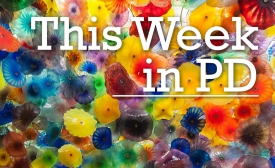europe

Headlines about art diplomacy are on display in this PD News roundup.
What if the solutions to Europe’s most pressing problems lie not in politics or diplomacy, but in art and culture? With the European Union under pressure from economic stagnation, a wave of refugees, terror attacks and the possibility of Britain leaving the bloc, more than 150 cultural figures from 37 countries — including the actor Jude Law and the architect Rem Koolhaas — gathered here at a forum last week to explore that possibility.
Though both sides indulged in diplomatic nice ties regarding the non-confrontational nature of the collaboration, with Iranian President Hassan Rouhani inviting other countries to join in developing the port, Islamabad’s precarious economy can hardly permit such participation.
A woman named Ghoson, sitting in front of a dark gray backdrop, begins to cry. Behind the film set, where she agreed to tell her story, awaits the refugee camp in Leros, Greece, that she is squatting in, biding her time until she will try to make her way further into Europe. [...] These visceral snippets of suffering and heartache are some of the stories chronicled in “Refuge,” a documentary film released Wednesday by production company Magna Carta.
Joseph Nye has been the preeminent thought leader on the issue of power dynamics and relationships connecting global actors. [...] What is the future of this American century? My guess is that among the range of possible futures, ones in which a new challenger such as Europe, Russia, India, Brazil or China surpasses the United States and precipitates the end of the American centrality to the global balance of power are not impossible, but not very likely.
States should use the increasing power of social media networks and work with them to achieve foreign policy objectives. [...] However, there is much more room for states to cooperate with social media rather than seeing it as an enemy. Instead, there are ample opportunities to use social media’s features, low costs and high effectiveness as tools to promote a state’s foreign policy objectives.
In an ideal world, the Eurovision Song Contest would be all about music and cross-border camaraderie. In reality, delicate diplomacy is essential to prevent politics from spilling into the annual glitz fest. A cast of hopeful artists from 26 countries will compete in this year's final on Saturday in Sweden, homeland of inventor Alfred Nobel, who gave his name to the famous international peace price.
If there's one thing on which Europeans agree with Donald Trump, it's that the U.S. is gradually losing to China. The Middle Kingdom is working hard to improve its image in Europe and investing lots of money along the way. The queen of England may think Chinese officials are "very rude," but outside Buckingham Palace they are winning influence and friends.







